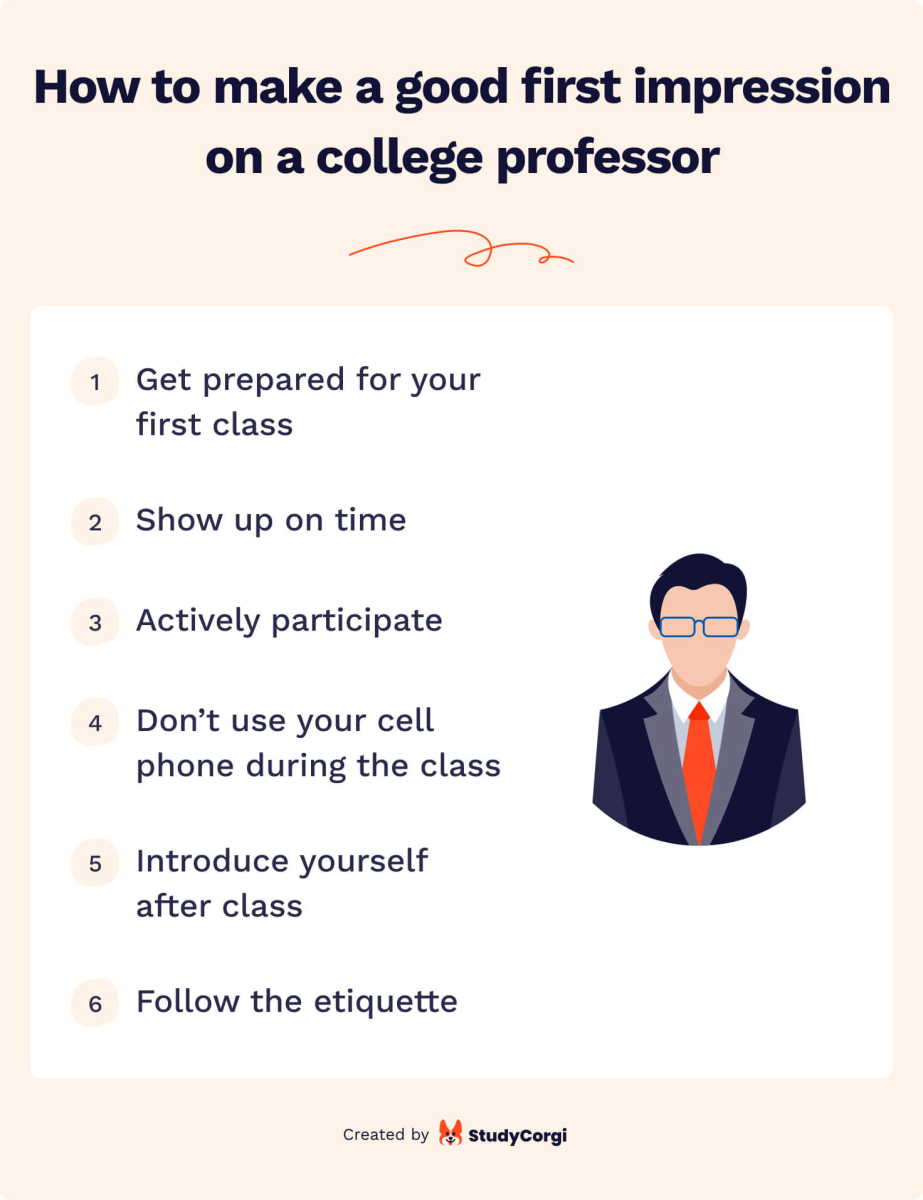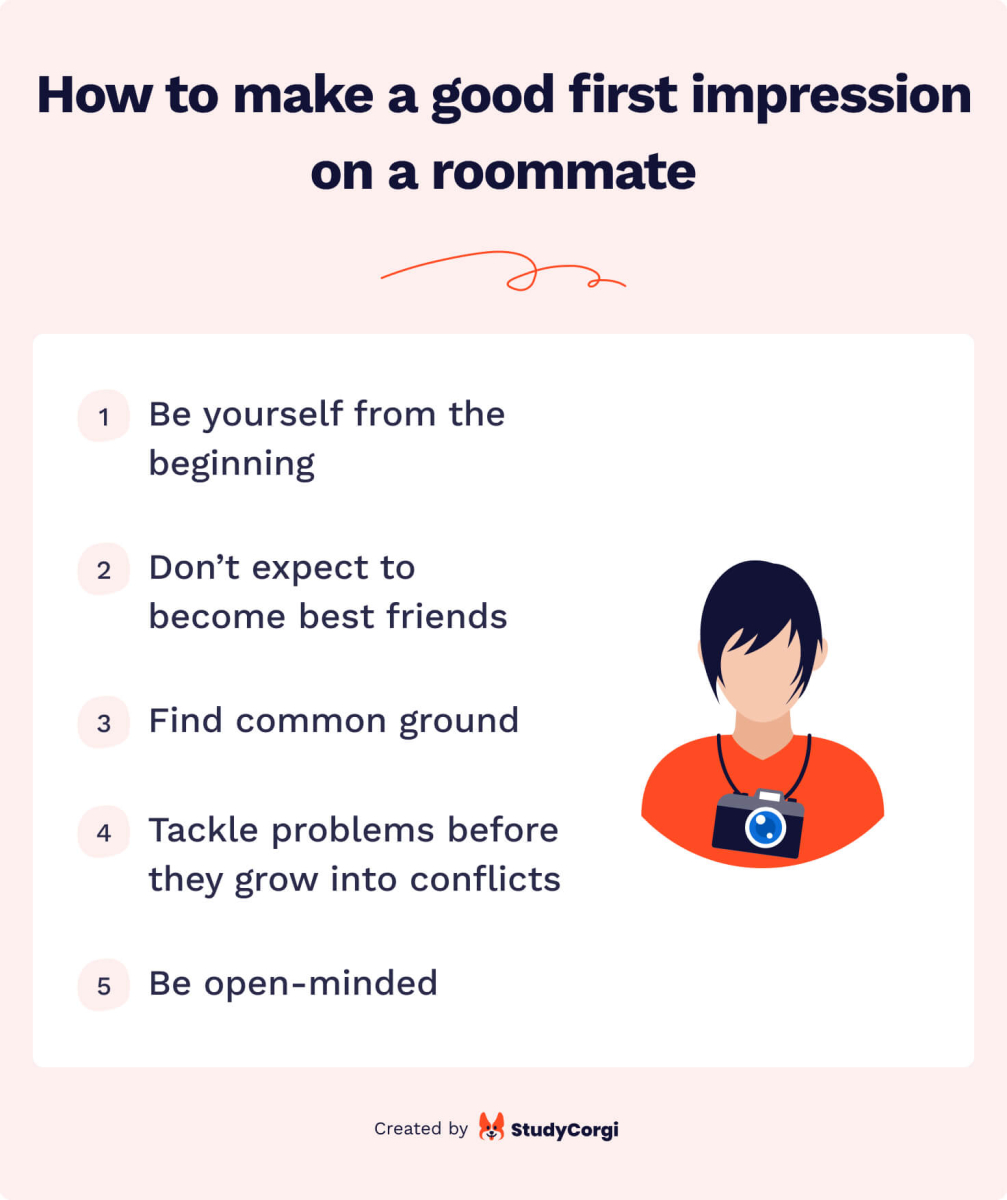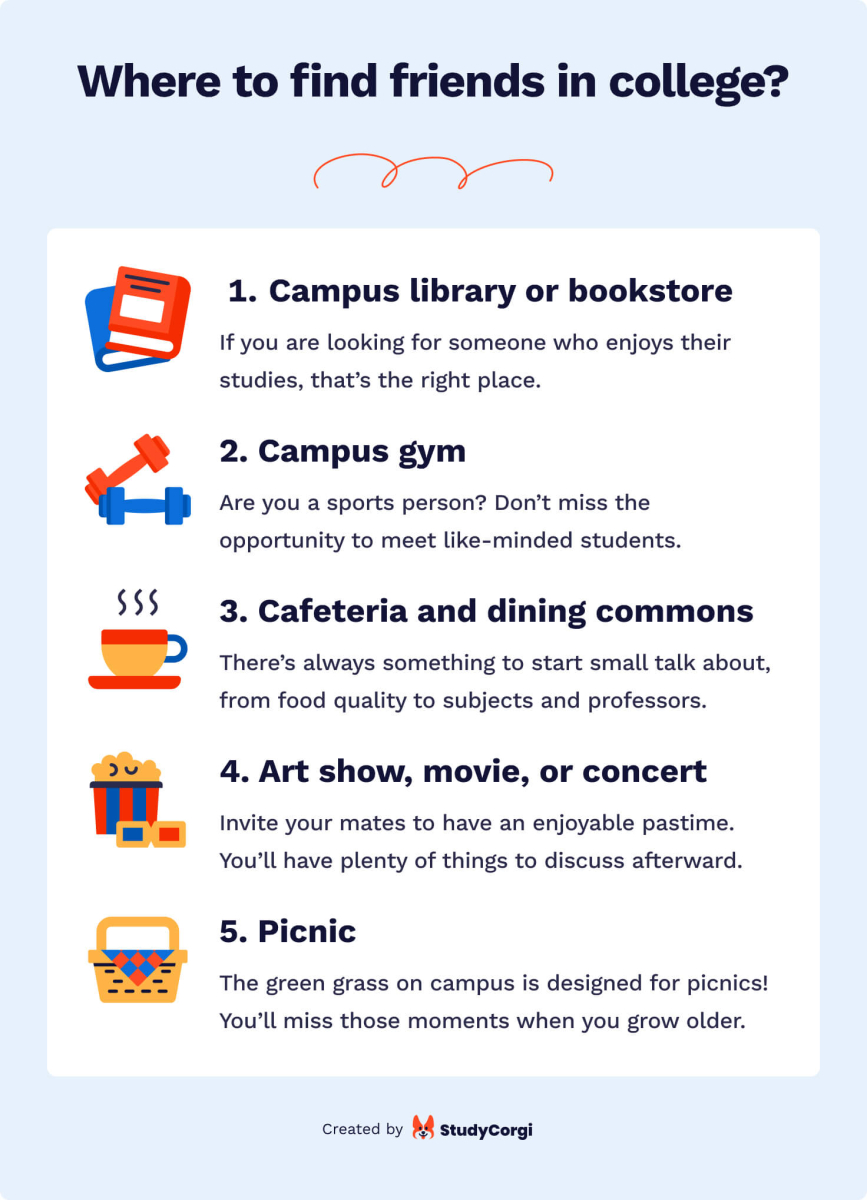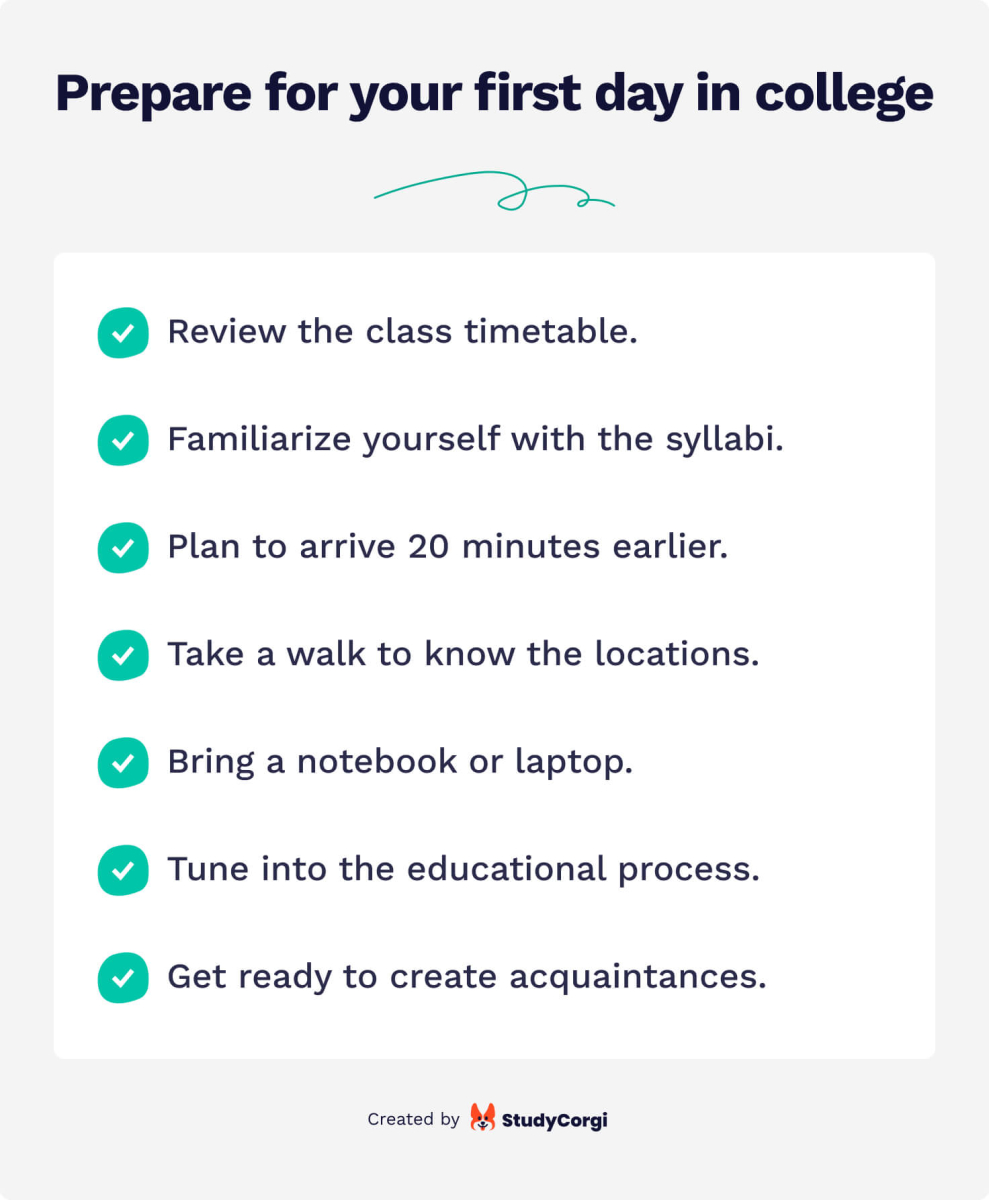It’s a well-known fact that no one can make a first impression twice. The 7/11 rule says that it only takes seven seconds to make eleven conclusions about someone, including their education, finances, competence, trustworthiness, and more.

How to make a good first impression on a classmate, teacher, or roommate? Many college newcomers wonder about this. In this article written by the Study Corgi team, you’ll find practical tips on how to feel confident and make a good first impression in college or any social situation.
🙋🏽 How to Make a Good First Impression on Your Classmates
On the first day of college, we rarely think about our classmates as potential work or life partners. But if you recall your high school relationships, you’ll realize how much they affected your success in the classroom.
A positive first impression guarantees that you’ll make friends in college.
Some of these people will be at your side throughout the rest of your life. Some will help you with your studies and other problems on campus. That’s why the best thing you can do now is to ensure you develop good relationships with your classmates.
Professors come and go once you complete a course. But classmates often stick around as friends. So, how can you make a good impression in college?

Show Your Kindly Disposition
Your body language says a lot, even more than you would prefer. And although you may not be able to control every manifestation of anxiety (fidgeting or hair twirling), you’ll want to take an open, welcoming stance when speaking with someone for the first time. For example, try not to cross your arms or legs. Instead, direct your feet toward the person and slightly incline your body towards them if you are seated.
A smile is the language of kindness, as William Arthur Ward noted. You might feel nervous and not so eager to smile. But remind yourself that everyone around you is a newcomer who feels the same way. Let them see your friendly face and help them feel a little less awkward too.
Answer with friendliness. Demonstrate how glad you are to make friends. The best way to do so is to answer with something more exciting than just “yes” or “no.” And don’t forget to ask about the person’s life and interests in return.
Make Your Style Speak for You
Your clothes should be comfortable. Choose clothing that doesn’t need a lot of attention. For example, avoid fabrics that wrinkle quickly or lose their form. It’s always better to put on something fresh for the first day of class, but if you haven’t worn it yet, do make sure it fits. This rule is particularly applicable to your shoes.
Clothes should add individuality to your image. Few of us boast a magnetic personality that attracts people regardless of our looks. And even if you do, a bright and memorable piece of clothing will do its job.
Don’t go overboard. However, as a follow-up, please make sure your clothes match. Looking flashy like a traffic light will attract attention, but not in the way you’d probably like. Try adding one bright detail to a generally conservative outfit.
Prepare a Self-Presentation
No, we’re not talking about PowerPoint slides of your childhood photos (although that may turn out to be a fun idea later on). Still, introducing yourself is a good thing to work on before meeting new people. Below, we’ve listed the most frequent questions that come up when you meet someone. It’s a good idea to prepare your answers. Besides, your future employer will probably ask you some of them at a job interview, so you’ll be killing two birds with one stone by preparing your answers now.
- What are your plans for the future?
- Why did you choose this college?
- What motivated your choice of profession?
- What is your family background?
- Do you have any hobbies?
- How do you spend your weekends?
- Do you already know someone here?
You’ll find out a lot about yourself while preparing the answers to these questions. And when the teacher asks you to present yourself, you’ll know exactly what to say. Try not to memorize a script though, or you’ll sound artificial.
Be a Pleasant Speaker
We all know how we’d like to be treated. But doing the same for others can be a challenge. Here’s a brief guide on becoming a nice person to talk to.
Initiate Contact
Don’t wait for others to approach you. Imagine what would happen if no one decided to take the initiative. Life would be so dull and lonely! So, whenever there’s an awkward moment of silence, speak up. The tips above will help you. Try asking one of the questions from the suggested list or make a compliment.
Suggest creating a group on WhatsApp or FB. If the first contact has been made, take the lead and arrange further communication through one of the messaging platforms. Being in contact will accelerate the development of relationships with your classmates.
Arrange a fun pastime after classes. Is there a new movie out? Or does the city organize a public event on the weekend? If you’re still wondering how to make friends in college, social activities are the answer.
👨🏽🏫️ How to Make a Good First Impression on a College Professor
High grades are just the tip of the iceberg for making a good impression on your teachers. Being on friendly terms with professors can lead you to grants, recommendations, and potential internships and jobs.
Good relationships with your teachers don’t just happen on the first day. They form as a result of your in-class activity throughout the semester, your commitment to your homework, and your personal appeal.
Yes, professors are also human beings, and individual preferences shouldn’t be overlooked. That’s why the first day is critical.

Find out how to make a good first impression on a college professor and stand out from your class with our tips below.
Be Prepared for Your First Class
Bring the textbook with you to show you take the class seriously. The chances of being asked to read are high. And asking for a classmate’s book during the lesson will probably be frowned upon. We recommend you get a current edition of the textbook. Although cheaper, an older edition may differ from the new one, making it harder for you to follow the professor’s explanations.
Read the first chapter. Do you remember how Hermione Granger from Harry Potter secured her success with the professors? She learned all the textbooks by heart before her education even began. Obviously, it isn’t necessary to go to that extreme, but the principle remains true. It is always easier to understand information that is slightly familiar. Regardless, it is critical to come prepared on the first day so that you can actively participate in class (read on to learn more about that).
Show up on Time
You’ll be surprised how many college professors count attendance as part of your participation grade. Arriving late entails multiple problems for the teacher, other students, and you:
- It disrupts the class.
- It draws everyone’s attention to you instead of the lecture.
- It demonstrates your lack of respect.
- The best seats will be occupied.
- You’ll miss the introduction, which may affect your understanding of the class.
We hope we’ve convinced you to wake up at least 20 minutes earlier on the first day of classes.
Actively Participate
Sit in the front row. Most students underestimate the benefit of this practice. It shows the professor your eagerness to participate and listen. Sitting in the back of the class demonstrates the contrary.
Listen and speak up. If you don’t know how to participate in a class, you probably haven’t been listening attentively enough. Answer the professor’s questions and ask your own. It might be a revelation to you, but when students are excited about a lesson, the professor becomes excited as well.
Take notes. You’ll need a pen and a notebook for this purpose. During the first lecture, the professor will introduce you to the subject and provide essential information about exams and homework. Having a pen and paper on hand will help you later on, and taking notes will show the teacher you’re following along.
Don’t Use Your Cell Phone During Class
This advice could have been included in the previous section, but we decided to emphasize it here. Never take out your cell phone during the first few weeks of class. You cannot predict the professor’s reaction yet, so don’t make this mistake.
If you are waiting for an important call, inform the professor before the class. Put the phone on vibration mode and quietly exit the room to answer. Talking on the phone in class is unacceptable.
Introduce Yourself after Class
Do you want to make a lasting impression on the professor? Approach them after the class and introduce yourself.
The best way to do so is to ask a question related to the lesson, but some small talk will also work. Next time, the professor will intuitively look for your eyes in the room.
You’ve shown them you listen and want to know more. This gives a rewarding feeling to any teacher.
Follow the Etiquette
Most likely, you’ll have to email and call your professor from time to time. Probably, it will happen right after the first class. You are expected to follow the principles of business communication, even though you may have never heard of them yet.
Email etiquette is based on 3 principles:
- Professionalism demonstrates that you are responsible and reliable. It is a sign that you are ready for your future career.
- Efficiency is the right use of space in your letter. Say what you want using the smallest number of words.
- Respect includes the right choice of phrases and the absence of small talk.
You can apply the same rules to your phone conversations. Start with a brief introduction, then get right to the point, and finish with gratitude.
🛏️ How to Make a Good First Impression on a Roommate
Living with a roommate is similar to living with a sibling, with the only difference being that you have no family bonds. This fact both complicates and simplifies everything at the same time. The benefit is that you can move out when things get really tough. And the drawback is that family relationships tend to make people more tolerant of our imperfections.

You are a stranger to your roommate. You have different social backgrounds, traditions, habits, and tolerance of conflict. How can you make a good first impression on a college roommate and build a healthy relationship that will make your studies more pleasant?
Be Yourself from the Beginning
Many of us chase “likes” from others at the expense of authenticity.
Don’t fake being a party-goer if you are not. Don’t pretend you are a nerd just to fit in. One day, the truth will reveal itself, and your relationships will be destroyed by disappointment.
On the contrary, if your roommates know what to expect from you from the very beginning, they will act accordingly. We are all different. That’s what makes our interaction interesting.
Don’t Expect to Become Best Friends
Aspirations to become besties set exaggerated expectations on your roommate. As a result, you’ll get discouraged every time something doesn’t work out. Who could thrive under such conditions? No one.
On the other hand, not being best friends with a roommate has its benefits. You’ll have different interests, won’t talk as much, and won’t distract each other as much from your homework.
Our suggestion is to aim for a stable and healthy partnership rather than look for a soulmate.
Find Common Ground
This tip is the most important and hardest to do. Our advice is for you to discuss possible points of conflict before they occur. For instance, you might go to bed around 10 p.m. and wake up at 6 a.m. This schedule is healthy, but few people are able to follow it.
Don’t try to convince your roommate to adapt their timetable to yours. Instead, do the following:
- Inform them about your habits.
- Ask the person about their habits respectively.
- Discuss how you both can manage the differences.
Try to keep this conversation relaxed. Avoid putting pressure on the roommate, but don’t let them intimidate you either.
Tackle Problems Before They Grow into Conflicts
The smaller the issue, the quicker you’ll resolve it. But even the tiniest conflicts grow over time. You won’t get too upset if a door slam interrupts your sleep only once. But if it happens every night, you will finally run out of patience.
You will be surprised that your roommate might not even realize they are doing something that bothers you. Try to tell them about it as calmly as possible.
And to mitigate the effect, ask if any of your behaviors irritates them. Such reciprocity is always appreciated.
Open-Mindedness Is the Key to Peace
Your roommate may come from a different country. Just imagine that! They grew up in an absolutely different environment. So don’t expect immediate mutual understanding. Get to know each other as much as you can (while respecting personal boundaries).
You’ll gain a lot of life experience in the process, which will be a great benefit in the eyes of your future employer because understanding cultural differences is a sought-after skill.
The best strategy to resolve conflict is always to choose curiosity instead of criticism. However, each case is unique. These tips for dorm living can make a difference in many complicated circumstances.
Being NICE is More Than Just Being Nice.
N Is for Neat
Have you heard of the KonMari Method? It helps you keep your things in order. Any surface in a room gradually becomes cluttered. But the problem is not in periodic cleaning. It consists of the excess of things we possess. Throw away or donate items you don’t need or enjoy anymore to keep your place neat.
I Is for Initiative
Most of us are familiar with the feeling of not wanting to clean up because there’s someone to do that for us. The memory of your parental home is still vivid in you, so you’ll likely postpone the cleanup as long as possible. Meanwhile, the same is probably true for your roommate. Take the initiative and discuss who will be responsible for what chores in your shared spaces.
C Is for Clean
Mind your hygiene. Don’t wait for your roommate to beg you to bathe. And do the laundry before a large pile accumulates. It’s that easy.
E is for Empathetic
Sometimes, all of us need help. When your roommate has barely found time to sleep, don’t press them to clean the room. That way, when you get into a similar situation, they’ll treat you the same way.
Respect Their Privacy
College dorms always lack privacy. You rarely have an opportunity to be alone. If this becomes an issue, make a schedule so that when one of you is out, the other one can have some time alone.
Another rule of thumb is to touch another person’s things only after you’ve been given explicit permission to do so.
It isn’t polite to take something that doesn’t belong to you merely because it is in your room.
👭 How to Make Friends in College
Youth is a time of enormous changes. But it is also a time of immense opportunities. People come and go, and this is not something to worry about. Do your best to preserve old friendships, but take the time to make new ones too.
College years bring many stressful situations, and it is always better to have someone at your side when you go through a rough period. But we all change over time.
Your high school friends may find their life partner or move to another country. They might not have as much time to hang out with you as often. That’s why your college years are the best period for making new friends. And the more, the better.
Go to the Right Places
College gives you an unparalleled opportunity to start from a clean slate. You won’t have a similar opportunity ever again. You are in a new place surrounded by thousands of new people, all of whom are of your age and have comparable interests. And most importantly, they are also fresh, new, and eager to make friends.

You can meet people all over your college or university, but some places work better than others. Check out the list below.
Be Initiative
Seek opportunities to talk, and don’t be picky about with whom. You never know who could end up being your best friend. Here we’ve listed several tips to smooth out the process.
- Don’t expect that every person you talk to will become your friend. The best strategy is to expect nothing from an interaction. Let it flow naturally, and do your best to enjoy learning new things and getting to know other people.
- Smile and make eye contact. Would you feel like approaching someone who’s hiding in the corner all alone? Not likely. A sullen stance rarely attracts favorable attention.
- Mirror their body language. While talking to someone, subtly imitate their posture and gestures. This helps to build rapport and makes you more likable.
- Think of exciting conversation starters. “Nice weather today, isn’t it?” is a boring choice. “Do you study here?” is also lousy because, in 99% of cases, the answer will be “yes.” Asking for help, giving a compliment, or joking about the atmosphere you both find yourselves in is much better.
- Carry on talking. Continue the conversation if the person looks interested or at least not irritated with your initiative. Ask follow-up questions (“Where did you get that latest edition of the journal?”), offer some related information about you (“My name is Steve. And yours?”), or just go with the flow.
- Invite them for a cup of coffee, tea, etc. If both of you enjoyed the small talk part or proceeded to a more personal conversation, it’s time to plan another meeting. Don’t wait for fate to do your job.
- Look for common ground. Do you both attend the same extracurricular activities? Or do you listen to similar music? Shared interests fuel a friendship better than anything else.
When Acquaintances Become Friends
You can’t force a friendship, but you can cultivate it. Have you ever wondered why some people – even if they’re not very intellectual or highly charismatic – have many friends while others have none? The answer is that they invest time in the relationships they have.
The Stanford Encyclopedia of Philosophy claims that there are three types of friendship:
- Friendships of pleasure emerge when people enjoy being together. It is the first step to the more genuine variant, i.e., a friendship of virtue.
- Friendships of utility are a standard win-win scenario. You help me, and I help you in return.
- Friendships of virtue are motivated by our attraction to the person. We like their character traits or outlook on life and want to stay close.
We believe that any solid relationship starts with one of the first two types and gradually evolves into the third one. What conclusion should you draw from this? To move from being acquainted to becoming friends, people should engage in pleasant activities together or exchange mutual services.
We cannot help but mention the danger of getting into abusive relationships. See if any red flags apply to the person you have befriended and, if so, maintain your distance.
😡 9 Mistakes that Might Ruin a First Impression
Watch out during those first classes! Below you’ll find a top-9 list of freshmen mistakes. There are a million ways to make a wrong impression on someone. For more information, check out this comprehensive article.
How to Ruin Your First Impression on the Classmates
How to Ruin Your First Impression on a Professor
✅ Getting Prepared for the First Day in College: The Checklist
We appreciate your perseverance! Those who have read up to this point get a bonus point. Here’s a checklist that will help you get ready for the first day of classes.

- Review the class timetable. Look through the schedule to see which textbooks you’ll need. This will also help you make a mental map of the campus.
- Familiarize yourself with the syllabi. Few students do this, and many more should. You are allowed to drop some classes during the first weeks of the semester, and you can replace them with other subjects. Reading the syllabi will let you evaluate the study program and decide if it is the class for you.
- Plan to arrive 20 minutes earlier. This means you’ll need to go to bed earlier than usual to wake up fresh and ready for new challenges. Prepare everything you will need the night before so that you don’t rush around the room looking for a notebook or item of clothing in the morning.
- Take a walk to get to know the campus. It’s best to do this before the first day of class. But if it’s not possible, use the time before the first class for this purpose.
- Bring a notebook or laptop. Remember that some professors don’t let their students use laptops during class. That’s why it’s better to also take a paper notebook.
- Tune into the educational process. Resolve to be as attentive as possible during the first month. Later you’ll figure out which classes deserve more attention.
- Get ready to make friends. You may have to introduce yourself to the class on the first day. What would you tell them about yourself?
The mere fact that you are reading this article tells a lot about how serious your intentions are. All the advice above is important, but it will be ineffective without confidence and a positive attitude. Breathe in, breathe out, and get ready to start your new life! Please share your stories about the first day of college in the comments below. Your experiences may help other anxious students.
